|
The Devils is coming to DVD. When I first read those words I nearly wept with joy. I've been waiting so long. History tells us that the new digital format first landed in the UK at the tail end of 1998. Allow a few months for the discs to appear and let's call it eleven years. That's how long I've been waiting for The Devils to appear on DVD. But Warner owns the rights to it and for some reason the company seem uninterested in letting it loose on digital disc. When Camus and I got to interview Ken Russell back in 2009, we briefly discussed the unavailability of The Devils on DVD and Russell laid the blame at the studio's door. "Warner's have this thing about it," he told us. "They're scared of it."
I was too young to see The Devils on its original release and for me the film thus remained the stuff of legend for some years, the subject of stories of outraged puritans protesting at screenings and scenes that had the potential to drive the impressionable insane. Oh how I wanted to see it. But back before the access offered by video and the web, this meant buying a ticket from someone whose job it was to deny entrance to anyone below the legally specified age. I wasn't even close. A young man who was later to become my closest friend was also was also not of legal age at this moment in time, but was older than me and gruff looking enough to pull off the required deception. But doing so exposed him to one small problem: The Festival of Light.
It all sounds so lovely, The Festival of Light, like a big party held to celebrate the aurora borealis. Oh, if only. The Nationwide Festival of Light, as they called themselves, was an organisation of self-righteous Christian busybodies openly opposed to anything that could be categorised by them as permissive or offensive to God. Actually not God, just people who bothered him. And they really hated The Devils. So what exactly was it about the film that so offended these people? The idea of it. That's all. It sounded wicked and so it probably was. You see, none of the protestors that my friend encountered and engaged in furious debate with (he did like to do that) had actually seen the film they were protesting against. They didn't need to, they told him. To do so would risk being corrupted by it and they had no intention of letting that happen. So concerned were they for the health of the planet that they considered it their duty to stand outside the cinema and attempt to dissuade us weaker minded souls from being corrupted as well. Think about this for a second. They believed, really believed, that you should be prevented from seeing a film, a genuinely great film at that, because of what those opposed to it thought might just be in it.* After debating with the protestors for a good twenty minutes, my friend brought the discussion to a sudden conclusion by assuring them that it was too late for him anyway, that he was already corrupt beyond any redemption, a claim he justified by spelling out in explicit detail some of the colourful sexual acts in which he had recently indulged in. Oddly enough, they not only let him pass, but went to great lengths to avoid physical contact, presumably in the belief that such perversion was contagious. We can only hope.
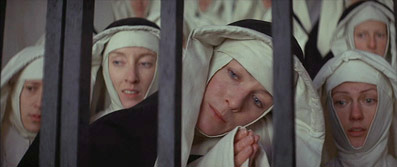
The irony is that one of this supposedly satanic film's principal concerns is how religious belief and dogma can be perverted and misused by the intolerant, the state, or the politically ambitious against those who are prepared to stand up for their beliefs, a message these idiots could actually have twisted to their advantage. There's even a case to be made for The Devils as a religiously reverential film, a viewpoint supported by Father Gene Phillips, consultant to the National Legion of Decency (don't get me started on that lot), who in one of the extras on this very release convincingly argues that while The Devils is a film that portrays blasphemy, it is not in itself a blasphemous film. But then, he's actually seen it. Mind you, given my contempt for the very idea of blasphemy, if the film was blasphemous I'd instead be vociferously defending its right to be so.
But I digress. Given our shared love for the film, Camus and I agreed to do a joint review, two different takes on what makes The Devils so special. After reading through Camus's promptly delivered coverage, however, I found myself in complete agreement with his every word and with little to add that wouldn't read like repetition or unnecessary expansion on succinctly made points. Camus has thus covered the film, the sound and vision and the extras on disc 1 (all of which, it should be noted, were written without access to the extras on disc 2), and I've handled the extra features on the second disc and the accompanying booklet.
Before I hand over to Camus, I'll leave you with this amusing but strongly worded anecdote (that's a warning, by the way) from John Baxter's enthralling but now out of print look at Russell's career titled An Appalling Talent: The Cinema of Ken Russell. Ken was recalling the conversations he had with BBFC director John Trevelyan prior to the film's release: "Of all the dozens of hours I spent arguing the pros and cons of this and that with John only one moment still sticks in my mind. 'I'm afraid we can't have Vanessa saying "cunt,"' he said. "It's taken me ten years of fighting just to get "fuck" accepted. I'm afraid the British public isn't yet ready for "cunt".'"
| |
"Oh yes, I know where everything is. All the good stuff. [Laughs] I could easily put my hands on it and give people the full uncut version. But Warner doesn't want to do it. It's a lost film now. You'll never see it the way I wanted you to. Never." |
| |
Ken Russell, interviewed about the censored footage, September 2010 http://totalscifionline.com/interviews/5545-ken-russell-devils-worship |
If that's true then it's a significant loss to cinema full stop, never mind so called 'British' cinema. Yes, it's also true that critic and The Devils champion, Mark Kermode has unearthed many of the shots and significant sequences missing from this particular DVD cut. Some of them can be seen on the Extras disc, notably within the Channel 4 documentary Hell On Earth (I don't have the 2nd Disc to hand so cannot confirm that the additional material cut from the movie is still included in this excellent documentary – more on this below) but all in all, Russell is right. He's now gone and any reconstruction of this masterpiece can only be done in a Walter Murch/Touch Of Evil fashion – close but without the participation of the living director, not 'the real thing'. And unless there's a great profit to be made, it's a safe bet that Warner Brothers won't allow it. That's a real pity. Don't get me wrong. I'm not slavering to see the excised shots and sequences because of their notoriety or my prurience. I want to see them in situ so Russell's movie can be appreciated as a whole work and not a truncated one that seemed to offend the truly offensive; those endarkened souls (Festival Of Light, my arse, please Wiki Mary Whitehouse) who craved censorial control over bold, artistic ventures and saw only what their craven psyches allowed them to see; 'rude' images allowed no intellectual or dramatic context by their catch-all net of moral absolutism, sequences shorn of the ideas that not only gave them life but made them soar. It was like criticising a power plug for its tri-phallic symbolism and deliberately ignoring the glorious scene being illuminated by its electricity. I'm on actor Dudley Sutton's side on this point (see 'Hell On Earth' on disc 2). His verbally violent defence of this classic movie and his dismissal of tiny-minded moral bigots is heart-warming. I owe the man several drinks.
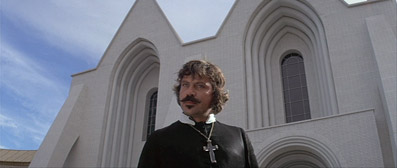
If you know nothing of the film, this should get you up to speed. In France in the 1630s, Father Grandier (Oliver Reed) is an attractive Catholic priest who has been given power over his hometown of Loudun, to maintain its fortifications against the Catholic Church's recent decision to prevent Protestants from uprising. Cardinal Richelieu (Christopher Logue) is stripping power from provincial towns and wants the last standing walls of Loudun taken down but Grandier is firm. Nearby, a convent of nuns is in awe of Grandier's sexual magnetism, especially the Reverend Mother played bravely and with a surreal zeal by Vanessa Redgrave. She indulges in a rich and erotic fantasy life that belies her standing in the community. When Richelieu demands the walls breached, he sends Baron Laubardemont (Sutton) to do the job. But he finds Grandier in complete control. To get Grandier out of the way, both Church and State begin a heinous charade to oust the resolute priest... The Devils deftly and sincerely weaves a tale of human frailty, love, repression, superstition, political chicanery and the meaning of goodness in human lives. And that's just for starters.
Grandier is no saint. He is no paragon of virtue for us to slot into the hero mould. In fact, he's a womanising bastard who drops his lovers the moment it's expedient (or they become pregnant). We are invited to see him as a flawed man first, a man who has given in to his primal urges but a man who also realises his faults and earnestly attempts to make them right in the eyes of the imaginary chap upstairs. He marries honestly and with grace and it's at that moment the poor sod decides to go to his town's defence not realising that the authorities have him stitched up to such an extent that he was a dead man the second he mounted his horse. Not to put too fine a point on it, Oliver Reed is simply breathtaking as Grandier. He has the strident physicality, the rough-hewn handsomeness and the sexual magnetism that makes the role one of the most convincing I've seen Reed play. For some unfathomable reason, the part of the doomed Father Grandier is a perfect fit for Reed. I'm sure the hell-raiser would be appalled. Well, perhaps not appalled.
His principal accuser, Vanessa Redgrave (the Reverend Mother), matches him in convincing intensity. Her body is a cauldron of unfulfilled sexual longing and violence erupts when least expected as she flies into a jealous rage against Grandier's new wife (Gemma Jones). Redgrave is electrifying. She has a physical impairment that stops her fantasies from explosive fulfilment but there are scenes when Russell doesn't just hint at female masturbation granting the Reverend Mother not just ordinary and base humanity but the terrible realisation that when her epiphany turned her life to the cross, it was resolutely full of splinters laying in wait. It's suggested by the history books that women unable to claim a husband were often sent to the Nunnery as they could not be catered for at home. Religious conversion may not have been the main reason for adopting the monastic life though I have very little experience myself in these matters. Today I suspect things are a little different. Christ, I hope so...

It's not just Grandier's libidinous aura that explodes like a sex-grenade inside the monastery. It's the doubt about the decisions these women have made, suppressing their human urge for procreation and sexual union that prompts so realistic performances when granted to do so. Outlaw a human instinct, provide a small outlet and watch the wimples fly... Russell's staging of the orgiastic scenes does not seem at all exploitative. Yes, you read that correctly. It is only after the nuns are offered the choice of death or a state-controlled feint of religious madness, do they let go. In effect, these characters are stripping, acting possessed and screwing for their very lives. Not so sexy now, huh? Of course, nuns stripping off to indulge in anything other than a chaste shower behind a tapestry curtain is a Whitehousian nightmare and it was the power of these scenes that was clipped by the censors. But these slight cuts were not what damaged the movie so badly (and yet, it still stands magnificent in its defiance).
For the record, there are three significant cuts and many other minor ones. One, intercut with Oliver Reed's respectful breaking of bread, is by far the most notorious. The hysterical and unclothed nuns take down a crucifix with a full size wooden rendition of Jesus C. and proceed to ravish it en masse while Mignon (Murray Melvin) fumbles under his cassock. The comparison of both sequences actually presents the Catholic Church is a good light (which I personally find offensive but what am I going to do, start a movement?) The sequence and its intercutting suggests the church's tenets are being perverted by those playing political power games. The Festival Of Light simply saw an anti-Lupercalia with added genitalia, not visually delivered ideas. The second significant cut is a riotously pornographic play that is performed at Grandier's execution (how tasteful) and the third and in terms of character the most interesting, is the broken femur masturbation sequence (you should type those words yourself, what a delicious and perverse little thrill). In terms of imagery (and there's nothing I can do about this), a broken femur looks like erect male genitalia. All I could think about was how sharp the broken end would be (shall we – and indeed the bone - not travel any further?) but to end the film with the Reverend Mother still obsessing while Grandier's true bride scales the broken walls and walks away from Loudun is visually extraordinary.
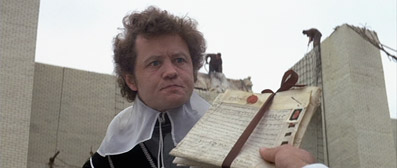
The grand themes are in place but there are dozens of small pleasures to be had from this masterful work. There are so many well-known British actors in the cast who subsequently turned up in all manner of comedies and dramas that the film feels almost homely... that is until Brian Murphy (put upon landlord George from TV sitcom Man About The House) starts picking through bowel contents – "It's a carrot!" – and Lovejoy's partner Tinker Dill (the afore mentioned Dudley Sutton) proclaims that "Hell will hold no surprises for you..." There's even the wonderfully over the top exorcist, Father Barre (Michael Gothard), perhaps better known as a Bond villain, who plays his part to the hilt. There are only two ways of playing an exorcist, balls out or balls in and Gothard belongs to the former camp. His disbelief at being so roundly tricked over a vial of Christ's blood is gold plated irony in a performance that leads me to believe the actor was inspired by a genuine regard for his director. In the middle of her exorcism, Vanessa Redgrave adopts an awkward position (on her back but still elevated on all fours) that can't help but remind any genre fan of Regan's infamous 'spider-walk' sequence from Kermode's other oft-supported focus point for his passion, The Exorcist.
And by no means least, there is Peter Maxwell Davies' violently percussive and surreal score that does more to put The Devils on another cinematic plane than any conventional orchestral interpretation. I'd not taken the score in until recent viewings but there is no doubt in my mind that a certain John Corigliano had Maxwell Davies' score in mind when approaching his work on Russell's Altered States. Not exactly brim full of hummable tunes, Maxwell Davies' work is exemplary for doing what great film scores must do – enhance the emotional content of the visual experience. Let's not ignore the celebrated and justifiably brilliant work of Derek Jarman, the then, pre-director, production designer. It's such a thrill to be able to see more detail at last and the DVD serves as a sort of Blu-ray taster. May this sell millions just to get the Blu-ray out there... The Devils is the director's masterpiece and weaves a spell like no comparable work. Fingers crossed that one day we may be able to see the original movie Russell actually made before the morality police blasted their siren and flashed their blue (festival of) light.
| postscript – a few words on the possession of righteousness, by Camus |
|
A man or woman with a starched white dog collar passes you in the street. Do you react with indifference, respect, amusement, surprise, jealousy or anger? Let's not emotionally limit ourselves. How do you really feel about those who have experienced a calling to do the supreme being's good work? Do these people make you feel lacking in some 'goodwill-to-all' part of your own psyche or, like me, are you astounded that there are people like yourselves who are so sure of their epiphany insomuch that they claim to know what the creator of the universe wants done with their own lives and what that immortal deity expects from everyone else's (and there's an awful lot to do with nudity and sex – Yaweh's funny like that). How do they 'know'? I'm intrigued. When, as a child, I heard the tests to establish a woman's status as a witch, I waited a long time, and am still waiting for the punch line. Just in case you've not had the pleasure of stumbling upon them, here's the official line circa 17th century. Throw a woman in water. If she sank (and usually drowned) she was innocent. If she floated she was a witch and hauled out for a more mundane execution. I guess the punch line is – and horrifically so – these people were (and in many places are still) in charge. Imagine a world in which superstition and religion are not marginal concerns (yes, OK, not the Middle East, uh... nor India nor the US... Jesus), a world in which a terrible fate awaited you if you even questioned the absolute rights of the church to control your and everyone else's destiny.
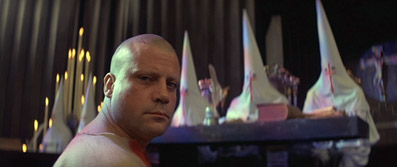
Well, welcome to Loudun in France or its alternative moniker, Kenrussellville featured in his finest film, The Devils. You have to tuck away your expectation (banish hope too) of reasonable human behaviour and cast your mind back four hundred years when god was the all powerful God, the penitent were patronised and the defiant crisped up alive like a flame grilled steak. It's odd but perhaps unsurprising that these outcomes were steered by events that were only really political in nature. If there were no power or profit to be had in monetary terms, religion would not be required to pronounce undesirables heretics. In some ways, religion served as the mace, shield and sword wielded by the knight of politics. You have to bear in mind that religious dogma and respect for complex, historical fairy tales were the staunch foundations upon which the medieval world stood. These rules in certain cases were absolute and to my shame as a human being, these rules are still enforced today (stonings for adultery, anyone?)
Four hundred years from now (if the human race makes it that far) will some civilised, reason-based 25th century society look back at the early 2000s and bow and shake their heads in shame? Will they think what a miracle it was we yanked our selves out of the quicksand of irrational belief and illusory afterlife comfort and sorted out global warming and world hunger? We are four hundred years from the real events portrayed in Ken Russell's masterful The Devils and how come the world doesn't seem that different today? Belief in the irrational and improvable holds sway in the global majority. Crowds are controlled with threats and promises and the human being, selfish at its core, still craves physical pleasure but receives from those in the apparent 'know' the promise of extraordinary suffering for simply being human. It's not 'Original Sin' we should fear. It's 'Original Spin'... Napoleon's words "Religion is excellent stuff for keeping people quiet," were never so relevant.
The aspect of Russell's hugely controversial movie that appeals most to me is that almost all of human life is here. The human condition – as pathetically susceptible to higher claims as ever – is peeled apart, layer by layer, in this remarkable work. Religion smashes into politics and both collide with the intensity of a presumed righteousness that can said to be at the very heart of the human animal. Did I forget sex? Slap my wrist. It was there all along in the word 'animal' (no disrespect to any animals intended). We are what we are. All we can do in the name of peace is to be as civilised as possible. And what is civilisation? French poet Charles Baudelarie said that "True civilisation... lies in the reduction of the traces of original sin..." the latter of which is the foundation on which Catholicism is built. Oops. Or as surfer Crush says in Finding Nemo "Righteous!" Somehow it sounds much better coming from a computer animated turtle that a person with a starched white collar...
Identical in content to my 1997 VHS release (rather naughtily championed as being widescreen when it was a 98% 1.85:1 presentation of a 2.35:1 aspect ratio), the movie on the BFI release DVD doesn't reinstate any of the most famously unseen slices of this extraordinary film. A pity but we've mourned that enough. Let's celebrate what is there, a terrific transfer from a DigiBeta master provided by Warner, much cleaner than a 1971 movie deserves to be. In fact as a standard definition DVD, it sparkles (in a good way).
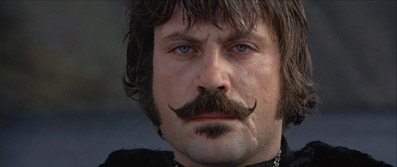
The original mono soundtrack scrubs up nicely presented in Dolby Digital 2.0 so there's nothing to complain about in terms of quality. There are Subtitles for the Hard of Hearing but in terms of Set Up, that's your lot. Editor Mike Bradsell explains on the commentary that no pre-mixes of original sound tracks exist any more (there being so much produced for a feature at that time, there was literally not enough room at Warners to store the materials). So a remixed 5.1 track was out of the question – a shame.
Disc One by Camus
Mark Kermode Introduction (2:05)
If nothing else, Kermode's presence on this DVD will grease the slipway for this wonderful film to be brought in from the cold touchline of overly and idiotically censored greats. He's obviously passionate about the subject and that can take anyone a long way. As he mentions in his latest book The Good, The Bad and the Multiplex, he's Britain's most trusted film critic. If that holds true then there's a chance that The Devils may find a new audience. Being a father of a fifteen year old, I get a great deal of satisfaction from my son discovering art and craft in film and television that I have been championing for years. It may be a few years before I suggest The Devils as a Sunday night treat...
Commentary by writer/director Ken Russell, editor Mike Bradsell and documentary producer (who made 'Hell On earth') Paul Joyce all mediated by Mark Kermode
This is a terrifically informative commentary with an older Russell's rasping, dry wit securely in place despite the advancing years. It's very refreshing to have the actual film editor (Mike Bradsell) on board with the director. Like all editors, he is wise, courteous, softly responsive to rarely deserved criticism and gives to many charities. Wait, scratch that. It's only two charities. Seriously, editors get very little exposure as co-architects of movies. It's just good to have that perspective instead of actors and directors musing on the froth of the pint rather than the nitty-gritty of the actual content. Kermode keeps everything ticking over nicely and treads the hair's breadth thin line between admiration and obsequiousness with delicacy and tact. As you may imagine given the context of the movie, there are some great stories and all four are willing and enthusiastic participants.
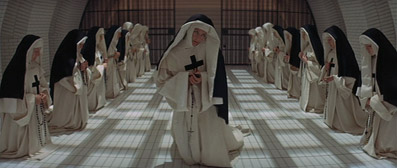
At 1 hour, 5 minutes and 30 seconds, all four men suddenly shut up and what, watch the movie? Mind you, this is when things get very interesting, narrative wise. There's a gap of just under two minutes. But what once was full on now becomes rather sporadic, like everyone was told to keep schtumm. (As it turns out, the commentary was recorded for 2004 director's cut and has been edited here to remove references to scenes that have not been included in this version.) Our attention is called to, of all people in the middle of the exorcism scene, Twiggy in the background (one of those details that can only come out in a movie commentary).
At 1 hour, 16 minutes and 45 seconds, the four collectively start up again and reveal a fascinating titbit that I knew nothing about. In the scene when Grandier is lying down (with that very sixties, fur collared dressing gown on) and Dudley Sutton trashes the statues and library while imploring him to confess to save time, it's revealed that there was another actor originally cast and shot in this part. Sutton does superbly, no question (climaxed by the line of dialogue that became the tag line for the poster). But originally, it was (deep breath) Spike Milligan in a straight acting performance who played this scene with Reed. No surprises that Russell felt that Milligan was so associated with his radio Goon persona that it would hurt the scene and against my own desire to see that performance I have to say he was probably right. It would be like casting Seth Rogen as a Nazi in Schindler's List.
The amount of historical accuracy in the film is staggering simply because it appears like slices from Derek Jarman's or Ken Russell's own imagination but as Russell says a few times, "You can't make this stuff up..." I won't list any more gems (Redgrave's mode of transport to the set, eyebrow insurance and Reed's voluminous underwear) and let you hear them for yourself. At the close, Kermode teeters towards fawning with the faintly tongue in cheek pronouncement "One of the ten greatest movies ever made..." "Not quite right," says Russell. "Maybe in the first three..."
UK Trailer (3:48)
Presented remarkably free of scratches and dirt in the original aspect ratio of 2.35:1, this UK trailer seems to prove that the marketing department of Warners UK felt that it was important to tell the entire story of The Devils in its lengthy running time. The first voice over sentence is terribly long and full of words marketing executives would never use today (were we a more sophisticated audience in 1971? – don't answer that). There is a small edit that in the context of having seen the film is hilarious. "And what form does this incubus take?" asks Mignon of Sister Jeanne... In the movie Redgrave proudly calls out "Cock!" In both trailers the same scene is included but it's been censored via a recording overlay that sounds like "Comp!" Possibly fearful of censorship even on this level, there's a two frame close up insert of Reed burning thus rendering any suspense those ignorant of the story may yet to experience. But then in 1971, a two frame edit was as good as not being there at all. This is a meaty example of the trailer art but way too detailed. Was someone concerned that you had to be told the story in shorthand before you could hope to 'get' the real thing?
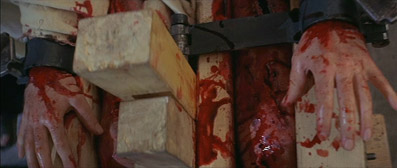
US Trailer (0:53)
"The Devils is not a film for everyone..." Was this the way the US marketing department held the movie between finger and thumb at arms length? This impressionist trailer is as far from the UK version as its possible to get. The movie is presented (in a cropped 1.85:1 ratio) as a much more scandalous and exploitative experience than its UK counterpart despite there being full frontal nudity in the UK trailer. I'd have seen the full movie based on this effort but only because I'm a sucker for what seemed 'this kind of film'... Having seen the actual movie, I'd have been far more satisfied by its intelligence, bravery and dramatic sweep and would have wondered what the hell the 'other movie' the trailer was actually advertising. "The devils burn..." Oh, right. Thanks for that.
Amelia and the Angels (25:45)
Russell's early film-making here is elbowing its way into his oeuvre. 1959's Amelia and the Angel is a silently shot, sweet little black and white film with added voice over and stock music cues. It's the story of naughty Amelia who steals her angel's wings from a school production and takes them home to show her mother. But her brother gets hold of them and ruins them sending Amelia off to find an alternate pair. I have no idea at all what was going on in the 32-year-old filmmaker's mind (the narrative is sweet which is an adjective relatively unfamiliar to Russell criticism) but as an early stab at narrative it's perfectly fine. Partnering this innocent little effort with The Devils must be someone at the BFI's idea of irony on a vast scale. But it's a thoughtful addition if not a particularly revealing one. Is Russell here prefiguring the role religion will have in his future career? Is it worth the time thinking about any significance of any filmmakers' early efforts? Probably not.
Disc 2 by Slarek
Hell on Earth (48:14)
If you're a long-standing fan of the film then there's a good chance you saw this excellent documentary when it was screened on Channel 4 in 2002. If you also taped it then I'd hang on to that recording – I'll get to why in a minute. Presented by film writer Mark Kermode, a long-standing devotee of the film, it traces the story of its production from Russell's first interest in adapting Huxley and Whiting to the controversy that dogged its initial release, with plenty of enthralling stories about the production itself and some level-headed analysis of the film's concerns and themes. There are interviews with a good many of those involved, including DoP David Watkin, composer Peter Maxwell Davies, art director Robert Cartwright, editor Michael Bradsell, actors Vanessa Redgrave, Dudley Sutton, Imogen Claire, Georgina Hale and Murray Melvin, and, of course, Ken Russell himself. President of the World Catholic Association for Communication Peter Malone provides some historical background to the true-life events that inspired the film, Russell's critical arch enemy Alexander Walker justifies his unsurprisingly negative review, and Legion of Decency Consultant Father Gene Phillips surprises the crap out of me by making a strong case for the film to be shown and seen in its uncut form. The late Derek Jarman is rightly praised for his extraordinary set designs (how Russell decided Jarman was someone he wanted to work with is an engaging story), which proved crucial to Russell's desire to portray the citizens of Loudun as modernists of their time. It's consistently excellent stuff that peaks with Kermode's success in locating a number of sequences that were once believed lost, including the notorious and much discussed "Rape of Christ" sequence, which is shown here in full...
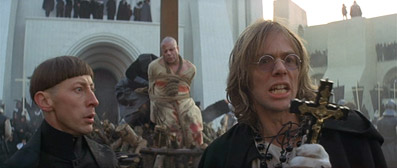
Except that it isn't. Those who saw and remember the original broadcast will likely be a little mystified when they watch the documentary here, as while it's essentially the same programme, the structure and some of the content has been altered, with Kermode's previously late-programme visit to Russell's Hampshire house shifted to the front end to contextualise the inclusion of extra interview material that was shot in Ken's garden. The moment when Dudley Sutton refers to the censors as "cunts" has been given the heave-ho (one suspects fear of legal trouble here), but the real arse-bite is when Kermode, Russell and guests sit down to watch the film's most notorious censored scene and this time around we don't get to watch it with them. Yep, forty years after the scene was first censored it's been censored again. Or has it? Given the BFI's commitment to film and British film in particular, I just couldn't believe they'd chosen to re-edit the documentary for fear of upsetting the BBFC or any surviving stragglers from the Festival of Light. No clues were provided in the accompanying booklet, which refers to this re-edit as an "alternative version" and makes a virtue of the extra interview material (and don't get me wrong, that's more than welcome), and a little research later I began to smell the controlling hand of Warner. Now I can't absolutely testify to any of this, but from what I've been able to dig up, it looks very much as if Warner have granted the BFI permission to the release the film, but only on DVD and only in its original UK theatrical release form, and I'm guessing those stipulations extend to not including any substantial portions of previously cut scenes in the extra features either. If you want to see the documentary in its original form then it's up on YouTube broken up into bite-sized pieces, and includes the scene that Warner doesn't want you to see, perhaps because they're planning their own, probably US-only Blu-ray release in the not too distant future? Watch this space.
Director of Devils (21:47)
A short documentary shot by Warner during the film's production whose opening narration has a whiff of guarded disapproval, but whose content gets a serious thumbs up. Russell himself discusses the historical events and characters that drive the narrative and his desire to create a sense of historical modernity, and there's some brief but interesting footage of the shoot itself. But the real meat of the piece is the recording of Peter Maxwell Davies's avant-garde score, which occupies the entire second half and makes for fascinating viewing.
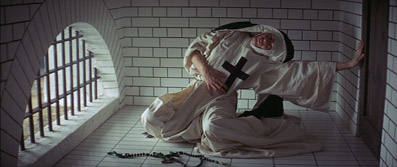
On-set footage with Michael Bradsell Commentary (7:36)
8mm footage shot on set by Editor Michael Bradsell, who also provides a commentary, albeit one that has been carefully prepared and plays more like a scripted narration. Fortunately, it's a good one, providing plenty of background information on the visuals, transforming what is effectively home movie footage (bloody good home movie footage) into a short but very worthwhile making-of documentary.
On stage Q&A with Ken Russell (13:00)
An excerpt from a doubtless far longer conversation between Mark Kermode and our Ken that focuses on Russell's discovery of classical music, his brief spell as a ballet dancer (honestly), the banning of his Monitor film on Richard Strauss, his conversion to Catholicism and, albeit briefly, The Devils.
Booklet
A 42-page booklet whose quality and content give top-of-form Masters of Cinema booklets a run for their money. This is a terrific companion to the main feature, featuring an essay on the film and its production by Mark Kermode, a detailed piece by BBFC Senior Examiner Craig Lapper on the film's censorship battle and the cuts that were made, a look at the career of Derek Jarman by Sam Ashby, recollections of working with Ken Russell by editor Michael Bradsell, solid biographies of Ken Russell, Oliver Reed and Vanessa Redgrave, production stills and documents, and full credits for the film and the extra features, including a short essay on Amelia and the Angel by Michael Brooke.
Camus: Wow! But what a chance missed to reinstate the film to its original former glory. Maybe the Blu-ray will address that. Let's just imagine that the US executives at Warner Brothers were 35 at the time the movie was made. So born in 1936, they'd be 76 now. Do they still have that much influence on a company now run by younger models of themselves? Can a film company hold a grudge outside of the individuals concerned? In short, what does Warner Brothers still have against The Devils after all this time? It's not as if its power has radically diminished (a point in its favour of course) because unfortunately, religion has not beaten a hasty retreat from reason and science in our oh-so civilised society. Criticise it (or appear to do so) is to face opprobrium from all sides. I'll just say this. If you have any interest in the art of cinema then Ken Russell is a director worth studying and as this is his best work, you owe it to yourself to hunt this disc out and revel in its apparent excess until you discover the nuggets of truth and wisdom about human nature that these excesses are uncovering. A masterpiece and a devilish treat.
Slarek: The absence of the rediscovered deleted scenes is a bit of a pisser, but my money's on Warner having imposed strict conditions on what the BFI can do with a film that they still hold the rights to. In the Hell on Earth documentary, Russell states he would like to see all the cut material restored, but in his final written article for The Times he expresses satisfaction with the version included on this disc, which he refers to as the director's cut due to the array of further cuts that were made to it when it crossed the Atlantic. I'd still like the option of viewing the deleted material or choosing between the theatrical cut and the 2004 restoration, whatever its condition. But even without these treats, this is a long dreamed-of release that the BFI have otherwise done handsomely by, with a fine transfer and a splendid collection of extras. See it and treasure the creative heights to which British cinema once climbed and the talent we have lost.
|